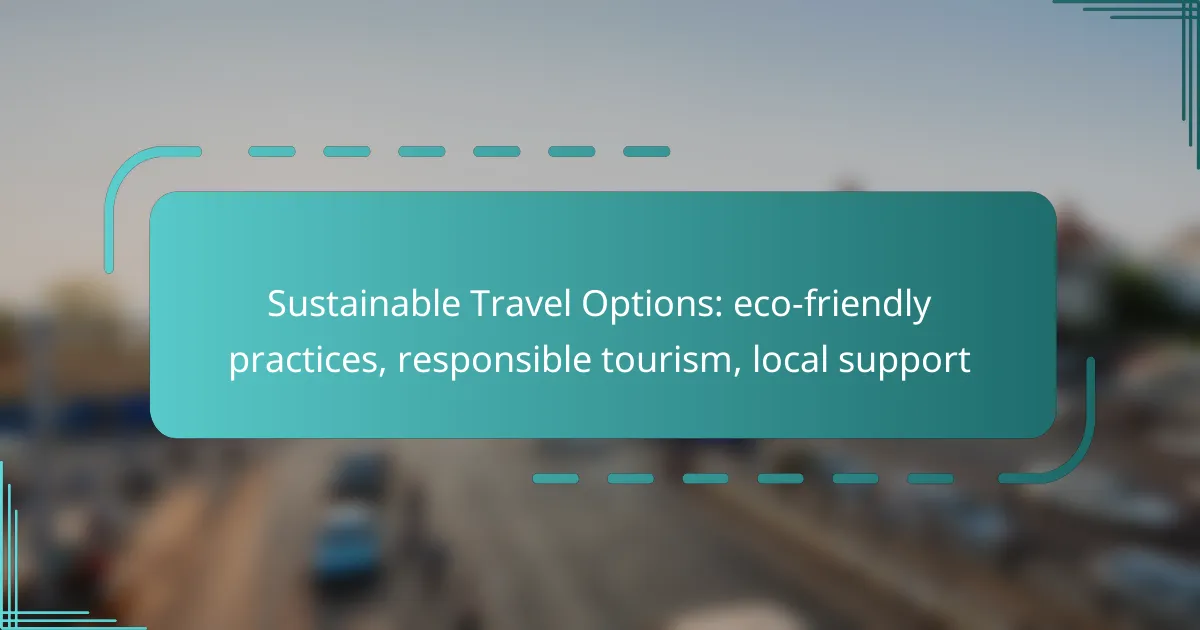Sustainable travel options are essential for minimizing environmental impact while enhancing the travel experience. By choosing eco-friendly accommodations, utilizing public transportation, and supporting local businesses, travelers can engage in responsible tourism that benefits both the planet and local communities. Adopting simple practices like using reusable products and selecting sustainable activities further contributes to a more positive travel footprint.

What are the best sustainable travel options in Europe?
The best sustainable travel options in Europe include eco-friendly accommodations, carbon offset programs, public transportation alternatives, and local tour operators. These practices not only reduce environmental impact but also support local economies and promote responsible tourism.
Eco-friendly accommodations
Eco-friendly accommodations prioritize sustainability through energy-efficient designs, renewable energy sources, and waste reduction practices. Look for hotels or lodges that have certifications like Green Key or EarthCheck, which indicate adherence to environmental standards.
Many eco-friendly options also incorporate local materials and support community initiatives. Consider staying in eco-lodges, hostels, or bed-and-breakfasts that emphasize local culture and sustainability.
Carbon offset programs
Carbon offset programs allow travelers to compensate for their carbon emissions by investing in projects that reduce greenhouse gases. These programs often fund renewable energy, reforestation, or energy efficiency projects in various regions.
When booking flights or accommodations, check if they offer carbon offset options. A typical offset cost might range from a few euros to tens of euros per trip, depending on the distance traveled and the specific program.
Public transportation alternatives
Using public transportation is one of the most effective ways to travel sustainably in Europe. Trains, trams, and buses are often more energy-efficient than cars and can significantly reduce your carbon footprint.
Many European cities have extensive public transport networks that are affordable and convenient. Consider purchasing multi-day passes or travel cards to save money while exploring urban areas.
Local tour operators
Choosing local tour operators enhances your travel experience while supporting the local economy. These operators often have a deeper understanding of the region and can provide authentic experiences that larger companies may overlook.
Look for operators that emphasize sustainable practices, such as small group sizes, responsible wildlife viewing, and community engagement. Reading reviews and checking certifications can help ensure you select a responsible local tour provider.

How can I practice responsible tourism?
Responsible tourism involves making conscious choices that minimize negative impacts on the environment and local communities while enhancing cultural understanding. By adopting eco-friendly practices, travelers can contribute to sustainable travel and support the places they visit.
Respect local cultures
Respecting local cultures means acknowledging and valuing the traditions, customs, and lifestyles of the communities you visit. Engage with locals, learn a few phrases in their language, and participate in cultural events to foster mutual understanding.
Be mindful of cultural sensitivities, such as dress codes in religious sites or local customs during festivals. Avoid taking photos without permission and always ask before sharing someone’s story or image online.
Minimize waste
Minimizing waste is crucial for sustainable travel. Carry reusable items like water bottles, shopping bags, and utensils to reduce single-use plastics. Many destinations now have refill stations and eco-friendly shops that support this practice.
When dining out, opt for places that prioritize sustainable practices, such as composting and recycling. Make an effort to leave no trace by disposing of waste properly and choosing accommodations that implement waste reduction strategies.
Support local businesses
Supporting local businesses helps boost the economy and ensures that your travel dollars benefit the community. Choose to eat at locally-owned restaurants, stay in guesthouses, and buy souvenirs from artisans instead of large commercial chains.
Look for tours and activities run by locals, as they often provide authentic experiences and insights into the culture. This not only enriches your travel experience but also fosters a sense of community and connection.

What eco-friendly practices should travelers adopt?
Travelers can adopt several eco-friendly practices to minimize their environmental impact and promote responsible tourism. Key practices include using reusable products, choosing sustainable activities, and reducing energy consumption during trips.
Using reusable products
Using reusable products is a straightforward way to reduce waste while traveling. Items such as water bottles, shopping bags, and utensils can significantly cut down on single-use plastics. Consider carrying a collapsible cup or a set of reusable straws to minimize your footprint.
Many destinations now offer refill stations for water bottles, making it easy to stay hydrated without purchasing bottled water. Look for local shops that sell eco-friendly products to support sustainable businesses.
Choosing sustainable activities
Opting for sustainable activities enhances your travel experience while supporting local communities. Activities like hiking, biking, and wildlife watching are often more eco-friendly than motorized tours. Research local operators that prioritize conservation and community engagement.
Participating in volunteer tourism can also be rewarding. Programs that focus on environmental conservation or community development allow travelers to give back while enjoying their surroundings. Always verify that these programs are reputable and truly benefit the local area.
Reducing energy consumption
Reducing energy consumption during travel can be achieved through simple actions. Turn off lights and unplug devices when not in use, and consider using public transportation instead of renting a car. This not only saves energy but also reduces carbon emissions.
When booking accommodations, look for eco-friendly hotels that implement energy-saving practices, such as solar panels or energy-efficient appliances. Many hotels now offer incentives for guests who choose to forego daily housekeeping, which can further reduce energy use.

What criteria should I consider for eco-friendly travel?
When considering eco-friendly travel, focus on sustainability practices, responsible tourism, and support for local communities. Key criteria include the environmental impact of your travel choices, the social implications of tourism in the destination, and how well you can contribute to local economies.
Certifications and ratings
Look for travel providers that have eco-certifications or ratings from recognized organizations. Certifications like Green Globe, EarthCheck, or the Rainforest Alliance indicate that a business adheres to specific environmental and social standards. Checking these credentials can help ensure your travel choices align with eco-friendly practices.
Additionally, review customer ratings and feedback on platforms like TripAdvisor or Booking.com. Travelers often share their experiences regarding sustainability efforts, which can provide insight into the effectiveness of a company’s eco-friendly initiatives.
Community impact
Assess how your travel choices affect local communities. Opt for accommodations and tours that employ local staff, use local products, and support community projects. This not only enhances your travel experience but also contributes to the economic well-being of the area.
Engage in activities that promote cultural exchange and respect local traditions. For example, participating in community-led tours or workshops can provide authentic experiences while ensuring that your presence benefits the local population. Avoid activities that exploit local resources or disrupt the community’s way of life.

What are the benefits of local support in tourism?
Local support in tourism fosters economic stability and cultural preservation within communities. By prioritizing local businesses and services, travelers contribute directly to the livelihoods of residents and help maintain the unique characteristics of their destinations.
Economic growth for communities
Supporting local tourism businesses stimulates economic growth by keeping money within the community. When travelers choose locally-owned hotels, restaurants, and shops, a larger portion of their spending remains in the area, benefiting local workers and entrepreneurs.
For instance, dining at a family-run restaurant instead of a chain can significantly impact the local economy. Studies suggest that local businesses often reinvest a higher percentage of their revenue back into the community, which can lead to job creation and improved public services.
Preservation of local culture
Local support in tourism plays a crucial role in preserving the cultural heritage of a destination. When tourists engage with local artisans, attend traditional events, or participate in cultural workshops, they help sustain the practices and traditions that define a community.
Moreover, responsible tourism encourages the development of authentic experiences that reflect the local way of life. This not only enriches the travel experience but also fosters respect and appreciation for diverse cultures, ensuring they are passed down to future generations.
